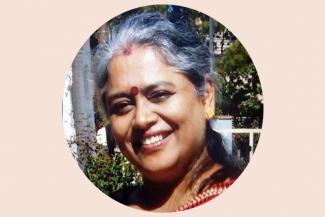
Nilanjana Maulik talks about the challenges faced by persons with dementia and their family caregivers during Covid-19 times and how ARDSI has supported these families remotely. She is National Coordinator - Working Group ARDSI (Alzheimer’s and Related Disorders Society of India) and Secretary, ARDSI Calcutta.
How do you think the disruption in the day care centres during the ongoing Pandemic has affected persons with dementia ? Can you give a few examples?
The COVID-19 pandemic is a huge challenge for people living with dementia in every aspect. The biggest being the isolation they are facing and many without fully understanding why. The other challenge is a change in their regular routine and this disruption has effects on their behaviour.
From higher stress levels to forgetting why they can’t go out leads them to pace up and down inside their homes, repetitive actions, anger at not being able to do what they want, and increased frustration with reminders about wearing masks, again without understanding why.
How do you think they have coped?
It has primarily depended on family caregivers who are trained to handle the changes and with meaningful engagements at home settings.
What has the pressure been like for the family members?
They are facing the double effects of COVID and Dementia. Without help initially they struggled to maintain their homes, their loved ones struggling with dementia as well as having to adhere to COVID norms. Some also had work pressures to deal with along with managing children.
How have you tried dealing with the situation?
As soon as we heard of the lockdown we came up with a guideline/workplan for our persons with dementia, their families and our organization. A careplan was shared with our client families that included resources we would offer like services & support both via online/in-person, list of available services in the community- like hospital taking covid patients, doctors to call, here we also utilized our network of nurses, volunteers to deliver medicine , groceries, call to check on families, also children performing arts and music that we shared online with persons with dementia. As an organization I started fundraising early on to support the salary and additional expenses during the period of inactivity. We also kept the staff motivated by providing them training and engaging them in building center resources for future. We continue to financially support our staff to commute in private transport to avoid them being exposed to Covid.
What are the most important things that the members have been missing about the day care centres?
The togetherness, the fun and the freedom to explore life beyond daily personal activities.
Clinically, is there any assessment that the lack of interaction for the members has been a setback?
If you mean whether done by us or others in India and with people with dementia, I am not aware. The only document I read was from the Ministry that was a general guideline that does mention the effects of covid on physical and emotional health of elderly in general.
In the absence of physical meetings, how have phone conversations helped? Who has benefited from this - the caregivers? Were patients themselves able to engage on phone?
Phone calls were always a big part of our communication with caregivers.
Our helpline maintains on an average 30/35 calls per week to check on caregivers. After Covid we increased that to 50 + in a week.
As for people with dementia, for those who are agitated we have the caregivers that they are used to call them up and the familiar voice is helpful to engage them otherwise and calm them down.
What is your advice to caregivers - how can they handle this situation?
Caregivers are tough nuts to crack. They have been facing numerous challenges in life similar or worse than the challenges of Covid that we are facing just 6 months now. Their struggle to maintain life started since they left the doctor’s office with the diagnosis, maybe several years back. So, its not advising but guiding them to the new challenges like establishing a new routine and reminding them to take care of themselves.
How is ARDSI planning to bridge the gap in the coming months since the pandemic still does not seem to be in abeyance?
Until there’s a cure for COVID-19, we plan to give care with care. As there is danger in isolation as it lowers immune response. We have already initiated online as well as in- person home companionship programme, our daycare should be opening shorty with limited members and with all due protocols. Caregivers have gone through several weeks of training in mock handling and role plays and developing skills to reduce risks. Social distancing is a ridiculous idea in dementia care. As a dementia care organization our aim is not to support global deterioration in a person with dementia but create positive changes, and that’s what we plan to do.
Dementia management has been shown to be quite responsive to virtual platforms. Assessment is strongly dependent on interview and questioning rather than direct physical examination. Most of our caregivers have reported similar satisfaction with virtual visits and in person visits.
What are your medium to long term plans to keep the ARDSI centres running?
By nature and as dementia artists we are dedicated to creativity and never waste a crisis situation to reap the best results. I believe life is a risk and we need to take risks in this situation and aim to deliver safe secure care when, where and how our clients need or want it. Our future plan also includes the use of technology with vigour and we have been making great impacts in the way we are delivering our work. The tools have allowed us to reach far more people than before and is here to stay with us.
Nilanjana Maulik, National Coordinator is the Working Group ARDSI (Alzheimer’s and Related Disorders Society of India) and Secretary, ARDSI Calcutta,






